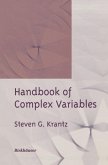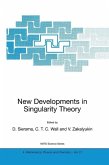This book presents complex analysis in one variable in the context of modern mathematics, with clear connections to several complex variables, de Rham theory, real analysis, and other branches of mathematics. Thus, covering spaces are used explicitly in dealing with Cauchy's theorem, real variable methods are illustrated in the Loman-Menchoff theorem and in the corona theorem, and the algebraic structure of the ring of holomorphic functions is studied. Using the unique position of complex analysis, a field drawing on many disciplines, the book also illustrates powerful mathematical ideas and tools, and requires minimal background material. Cohomological methods are introduced, both in connection with the existence of primitives and in the study of meromorphic functionas on a compact Riemann surface. The proof of Picard's theorem given here illustrates the strong restrictions on holomorphic mappings imposed by curvature conditions. New to this second edition, a collection of over 100 pages worth of exercises, problems, and examples gives students an opportunity to consolidate their command of complex analysis and its relations to other branches of mathematics, including advanced calculus, topology, and real applications.
Dieser Download kann aus rechtlichen Gründen nur mit Rechnungsadresse in A, B, BG, CY, CZ, D, DK, EW, E, FIN, F, GR, HR, H, IRL, I, LT, L, LR, M, NL, PL, P, R, S, SLO, SK ausgeliefert werden.
"The first part of the book under review represents essentially the material of R. Narasimhan's 'Complex analysis in one variable' (first edition, 1985). The second part of the book, authored by Y. Nievergelt, consists of exercises and relevant references.... There are notes at the end of each chapter which contain brief remarks on the history of the material presented as well as references to the literature. The exercises of part II give the reader the opportunity to consolidate his knowledge in complex analysis. At the end of this part there are notes for the exercises and references. The book can be highly recommended for a thorough study of complex analysis." -ZENTRALBLATT MATH (Review of the second edition) "The book introduces and makes use of concepts from many different areas of mathematics, especially ideas used in several complex variables and differential geometry. There is also a short...introductory chapter dealing with several complex variables.... The exercises in Part 2 vary from basic to advanced, and provide good practice for the concepts and techniques of the subject.... The choice of topics covered gives an excellent introduction to modern complex analysis. The exposition is well written. All in all, this book is a welcome addition to the list of books presenting a first course in complex analysis." -MATHEMATICAL REVIEWS (Review of the second edition) "Provides a smooth and unintimidating transition from classical complex analysis in the plane to modern abstract theory on manifolds... An excellent, carefully written and thematically rich book which does not overwhelm the reader... Well-suited as a textbook either for sophisticated beginners or as a sequel to a one-semester introductory course." -JAHRESBERICHT DER DMV (Review of the first edition)









